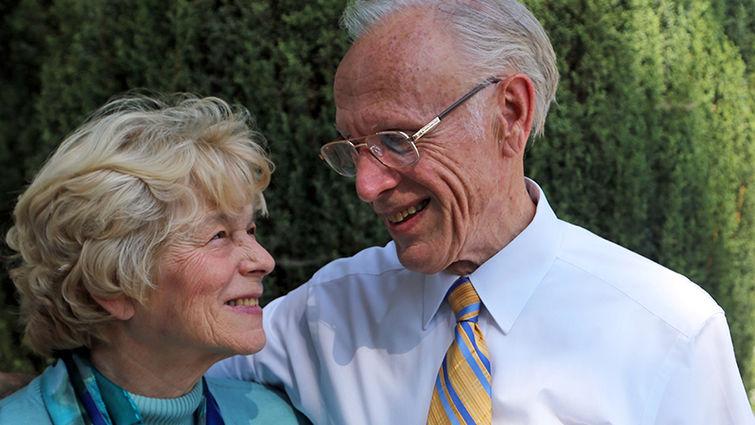
Kirsty and Clyde Roggenkamp
Clyde Roggenkamp, DDS, MSD, turned the early learning experiences of his life into desirable outcomes.
In the summer of 2016, the associate professor at Loma Linda University School of Dentistry and his wife, Kirsty, made a significant gift to support biomedical research at the school.
The story begins in Takoma Park, Maryland, where Clyde’s father was a podiatrist and his mother a registered nurse.
“My first job was at Washington Sanitarium,” he remembers, “preparing and distributing food trays to patients.”
Fifty-five cents per hour seemed like a great wage to the teenager, but Clyde subtracted hours worked on Sabbath, contributing those earnings to the annual harvest ingathering campaign for world missions at his church. He eventually won the Jasper Wayne stewardship award for his faithfulness.
When he was old enough to drive, Clyde got a part-time job cleaning buses and other transport vehicles for the maintenance department of the General Conference of Seventh-day Adventists. The new job taught him to clean and repair things on a large scale. Those skills would serve him very well in years to come.
During his pre-dental program at Emmanuel Missionary College, Clyde worked in the grounds maintenance and laundry departments. "The money helped with tuition," he says, "but the hands-on experience imparted skills that have served me the rest of my life.”
By the time he enrolled in dental school at Loma Linda, Clyde supplemented his resources by vacuuming carpets in the medical center at night and waxing cast gold crowns and making full dentures part-time.
“The pay was only $1.40 per hour,” he recalls, “but the practical knowledge and gained proficiency were invaluable!”
After graduation, Clyde determined to practice dentistry in an area of great need, so he moved to Vermont, the least populous of the United States and the one with the lowest ratio of dentists per members of the general population. But after six years in the Green Mountain State—where he earned enough to make a living, but not to pay his school bills—Clyde enlisted in the U.S. Air Force.
Although he enjoyed Air Force life, his first wife (he and Kirsty have only been married five years) disliked the prospect of moving every three or four years.
“To buy a house and get it all set up, then have to re-sell it due to permanent change-of-station orders, didn’t allow enough time for the property to appreciate in value,” he reports. Clyde chose to keep the houses and turn them into rental properties. When he retired from the Air Force, he had three rental homes, each of which had significantly appreciated.
Under the terms of the 1031 Tax Exchange, Clyde sold the houses and some Indiana farmland he had inherited. The process allows sellers to defer capital gains taxes so long as monies from the sale of the property are reinvested within a proscribed time frame.
“When I came to Loma Linda as a new faculty member,” he adds, “the proceeds were enough to purchase 10 rental apartments near the campus.”
The new apartments involved heavy responsibilities. “Some of the apartments were in rough condition,” he explains.
Despite Clyde’s janitorial and maintenance experience, there were times when it seemed a bit overwhelming. “I had to continually remind myself not to let it interfere with my real job of teaching at the dental school,” he reports.
The former dental student resolved to rent exclusively to dental students and to keep rates as low as possible.
After 15 years of hard work, Clyde’s industrious habits paid off in a big way. The apartments had created more than $1,000,000 in gross receipts over the years, but they had also appreciated in value to approximately that same amount. He and Kirsty evaluated the situation and decided to donate six apartments to the School of Dentistry.
“When it came to supporting the school,” Clyde reports, “I wanted to make a contribution that would benefit students.” They stipulated that the income be used to purchase an Instron testing machine, a scanning electron microscope, and a micro CT scanner
“These items of equipment will advance capability for significant research by students and faculty within the dental school,” Clyde observes.
According to Tim Sherwin, MS, senior development officer for the school, the gift will help ensure that future generations will have access to the finest in dental technology.
“We are extremely grateful to Clyde and Kirsty Roggenkamp for their generosity,” Sherwin states. “Their willingness to share the benefits of Clyde’s hard work marks this as a very special gift. They have set an example of faithfulness and accountability."
Looking back, Clyde senses the hand of Providence at work.
“It is inspiring,” he concludes, “to perceive divine influence in our lives, leading in certain ways over time. If the mission of the university will be benefited as a result, it is certainly all to the credit and glory of God.”
The Roggencamp gift is a part of the School of Dentistry’s Vision 2020 research priority. Vision 2020 – The Campaign for a Whole Tomorrow is a $360 million comprehensive fundraising campaign to support priorities in Clinical Care, Education, Research and Wholeness. Vision 2020 is the largest philanthropic initiative in the history of Loma Linda University Health, and represents the largest investment in health care and education in the Inland Empire. Learn more about Vision 2020 at https://lluh.org/vision-2020.
_____________________________
Loma Linda University Health’s experienced professionals can show you residential, commercial, or undeveloped real estate may be the perfect way to make a charitable gift. For more information, contact Todd Mekelburg, director of planned giving, by phone at (909) 558-4553 or email him at: [email protected]
